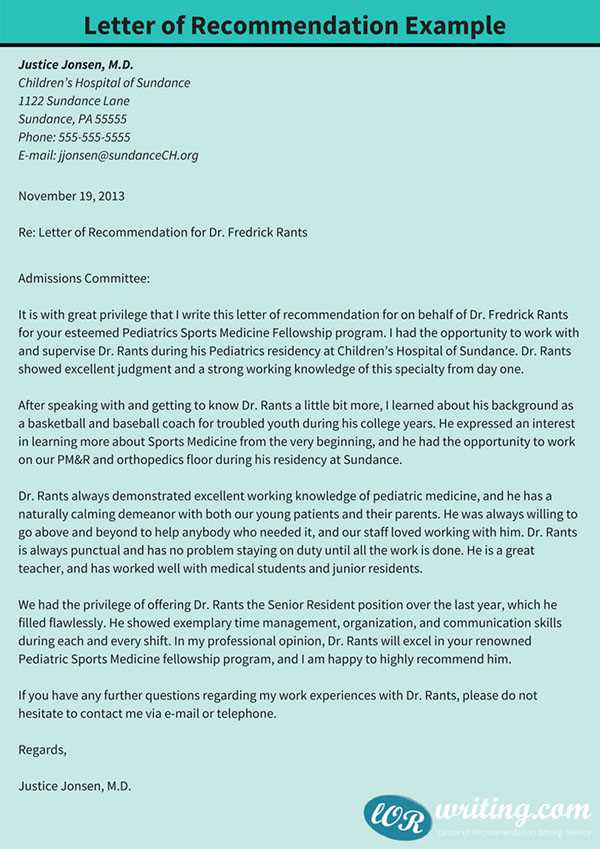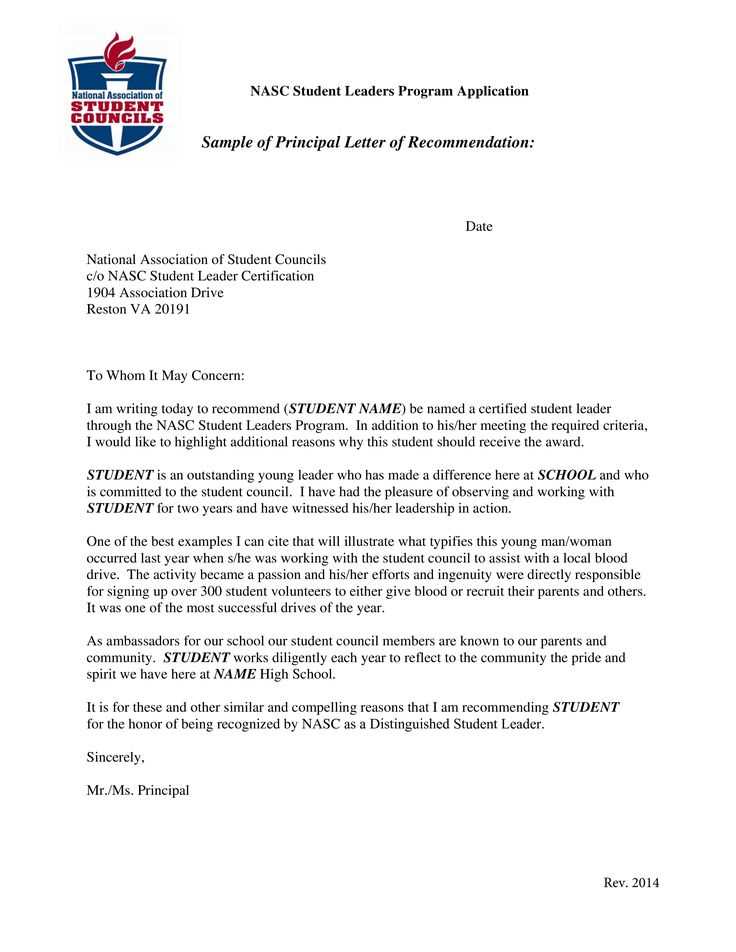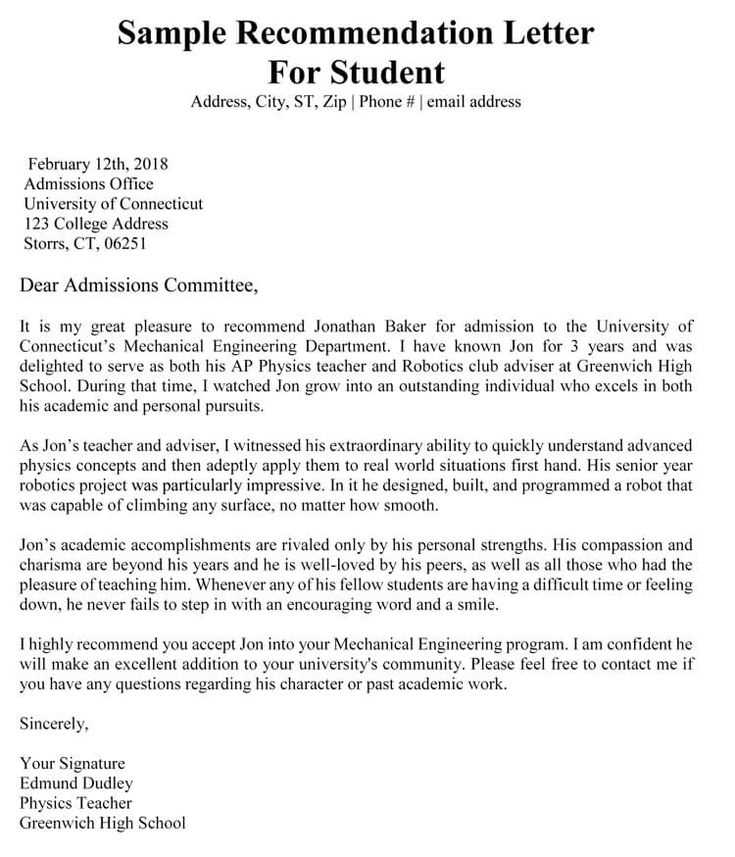Sports Letter of Recommendation Template for Coaches

Writing a supportive message for an athlete is an essential task, often needed when showcasing their skills and character. Whether for academic purposes, scholarship applications, or job opportunities, a well-crafted endorsement can make a significant difference in highlighting the individual’s qualities. This section will guide you through the process of creating a compelling statement that reflects the athlete’s abilities, achievements, and potential.
To ensure the endorsement is effective, it must be structured properly and focus on key aspects of the individual’s performance. The goal is to present a clear, concise, and sincere representation of the athlete’s strengths, both on and off the field. In the following, we will explore the core components and useful tips for crafting an impactful endorsement.
How to Write a Sports Recommendation
Creating a strong endorsement for an athlete requires clear structure and focused content. The goal is to present the individual’s abilities, work ethic, and personality in a way that aligns with the purpose of the document. By following key steps, you can craft a persuasive and effective message that leaves a lasting impression.
Start by organizing your thoughts and gathering all relevant information about the individual. Consider their achievements, dedication, and character, as these are critical components to highlight in the text.
- Begin with an introduction: Briefly explain your relationship with the person and the context in which you have worked together.
- Focus on key strengths: Discuss specific skills, achievements, and qualities that set the individual apart.
- Provide examples: Include concrete instances where the person demonstrated leadership, teamwork, or other relevant qualities.
- Conclude with a summary: Reinforce why this person is a strong candidate and how they will excel in future opportunities.
Remember, a well-crafted statement should be both heartfelt and professional, reflecting the athlete’s true potential and your genuine belief in their abilities.
Key Elements of an Effective Letter
For an endorsement to be compelling and impactful, it must contain specific elements that make the athlete stand out. These components help create a well-rounded portrayal of the individual and enhance the overall message. Understanding these key aspects ensures that the document is not only informative but also persuasive.
- Introduction: Clearly introduce who you are, how you know the athlete, and the context in which you’ve worked with them. This establishes credibility and relevance.
- Highlighting Achievements: Focus on the athlete’s accomplishments, both in their sport and in other areas like leadership, teamwork, and discipline.
- Character Traits: Emphasize personal qualities such as work ethic, determination, and integrity. These traits contribute to their success and future potential.
- Specific Examples: Provide concrete instances of the athlete’s abilities, such as memorable performances or moments that showcase their dedication.
- Closing Statement: End with a strong, clear endorsement of the athlete, summarizing why they are a suitable candidate for whatever opportunity they are pursuing.
By carefully integrating these elements, you can create a document that effectively conveys the athlete’s value and leaves a positive impression on the reader.
Best Practices for Drafting Recommendations

Creating a strong and persuasive endorsement requires following a few key practices that ensure clarity, relevance, and professionalism. By adhering to these guidelines, you can craft a message that effectively highlights the individual’s strengths and makes a compelling case for their potential.
- Be Specific: Avoid general statements. Use detailed examples to support claims about the individual’s performance and character.
- Keep It Concise: Ensure the document is clear and to the point, focusing on the most important qualities and achievements.
- Use Positive Language: Highlight the person’s strengths with positive and confident language that conveys your belief in their abilities.
- Maintain a Professional Tone: While being supportive, make sure the tone remains formal and appropriate for the audience.
- Proofread: Carefully review the content for errors, ensuring that the final version is polished and free from mistakes.
By incorporating these best practices, you can create an endorsement that is both effective and impactful, leaving a lasting impression on the reader.
Customizing the Letter for Different Sports
When writing an endorsement for an athlete, it is essential to tailor the message to the specific demands and characteristics of the discipline they practice. Each field has unique requirements, and addressing these can help emphasize the athlete’s skills and qualities that are most relevant to their chosen activity. Personalizing the content ensures that the individual’s strengths are presented in the best light possible.
- Focus on Relevant Skills: Highlight the skills that are most important for the specific activity, whether it’s endurance, speed, strength, or technical ability.
- Use Appropriate Terminology: Incorporate the language and terminology specific to the sport to demonstrate familiarity with the field and enhance credibility.
- Emphasize Discipline-Specific Achievements: Discuss accomplishments that are particularly valued in the sport, such as competition results, rankings, or notable milestones.
- Adapt Tone to the Sport: For high-contact sports like football or rugby, focus on toughness and resilience, while for more technical disciplines like swimming or gymnastics, highlight precision and focus.
By adjusting the content to fit the specific needs and values of the sport, you can create a more targeted and persuasive endorsement that resonates with the intended audience.
Common Errors to Avoid in Recommendations
When drafting an endorsement, it’s crucial to avoid common mistakes that can undermine its effectiveness. These errors can weaken the impact of your message and fail to present the individual in the best possible light. By being aware of these pitfalls, you can ensure that your endorsement remains strong, clear, and compelling.
Vague or General Statements

One of the most common mistakes is using broad or unspecific language that fails to highlight the athlete’s unique qualities. Avoid generic phrases like “he is a good player” or “she works hard.” Instead, use concrete examples to back up your claims, demonstrating their strengths with specific instances.
Overemphasis on Weaknesses
While it is important to be honest, focusing too much on an athlete’s weaknesses can diminish the overall message. If discussing areas of improvement, make sure to frame them positively and in a way that shows the athlete’s willingness to grow and overcome challenges.
By steering clear of these errors, you can create a more effective and persuasive endorsement that accurately represents the individual’s strengths and potential.
What Coaches Seek in Letters
When reviewing an endorsement, coaches are looking for specific qualities and information that will help them assess the athlete’s potential for success. A well-crafted document can provide valuable insights into not only the individual’s abilities but also their character, work ethic, and fit for the team or program. Understanding what coaches prioritize allows you to focus on the most important aspects of the athlete’s profile.
| What Coaches Look For | Why It’s Important |
|---|---|
| Work Ethic | Coaches want individuals who are dedicated and consistently put in the effort, whether in training or competition. |
| Teamwork | Ability to collaborate effectively with teammates is crucial for success in any discipline. |
| Leadership Skills | Coaches value athletes who inspire and guide others, both on and off the field. |
| Resilience | Being able to bounce back from setbacks and maintain focus under pressure is essential for athletes. |
| Character | Honesty, integrity, and a strong moral foundation are traits that coaches seek in athletes for long-term success. |
By addressing these key attributes, an endorsement can effectively communicate the athlete’s suitability for a particular role, increasing their chances of being noticed by coaches.
Final Tips for Crafting a Strong Letter
When finalizing an endorsement, it’s essential to ensure that every aspect of the document contributes to creating a compelling and professional message. A strong endorsement not only highlights the individual’s abilities but also provides an honest and clear perspective on their qualities. Here are a few key strategies to elevate your writing.
Be Specific and Detailed
General statements often lack impact. Instead of saying someone is “hardworking,” provide an example of how they showed dedication, whether it was in practice, a competition, or their overall commitment to improving.
Maintain a Positive Tone
While it’s important to be honest, always strive to present the individual in the best light. Focus on their strengths, and if you do mention any weaknesses, make sure to balance them with constructive feedback or an indication of growth.
Keep It Concise
Avoid unnecessary fluff or repetition. Stick to the key points, and make sure each sentence adds value to the endorsement.
Proofread Carefully
Before finalizing the document, take time to proofread it for spelling, grammar, and clarity. A polished endorsement reflects well on both you and the individual you are endorsing.
By following these tips, you can create an endorsement that stands out and effectively supports the individual’s goals, whether for a team, program, or opportunity.